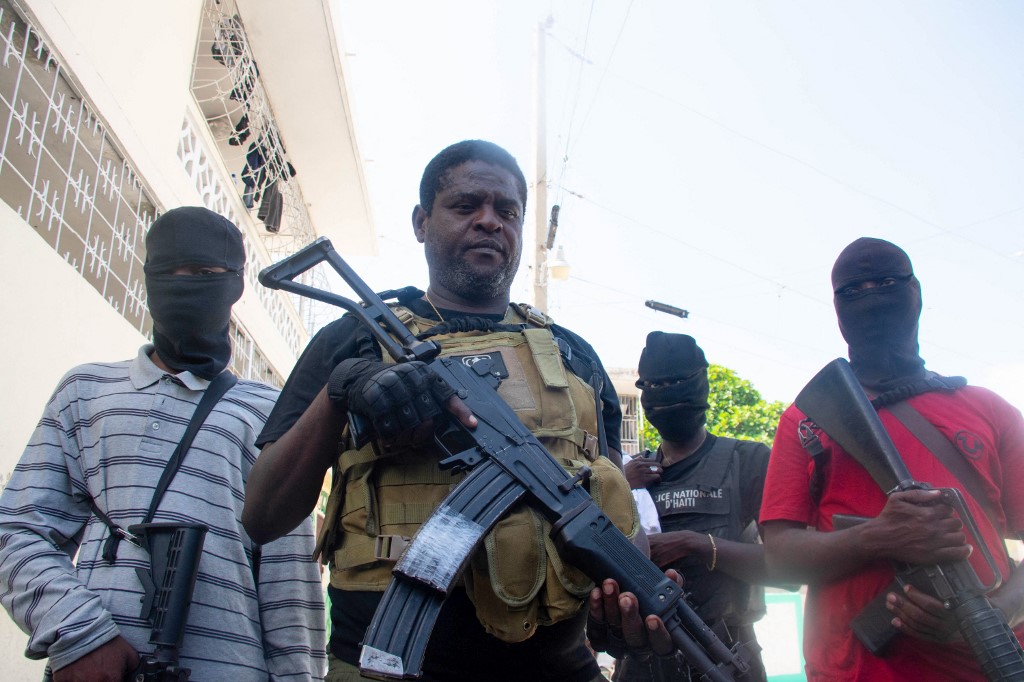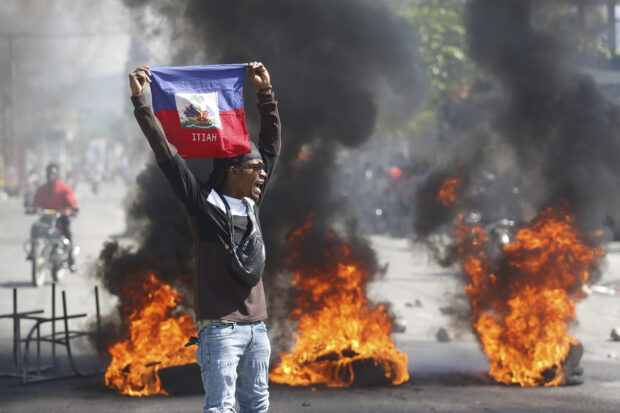‘Barbecue’ – The Haiti policeman turned feared gang leader

Armed gang leader Jimmy “Barbecue” Cherizier and his men are seen in Port-au-Prince, Haiti, March 5,2024. Haiti’s police academy came under attack by an armed gang on March 5, as the tiny Caribbean nation fell into deeper isolation in the wake of an assault on the airport and a deadly prison breakout. The attack on the academy, where more than 800 cadets are training, was repelled after the arrival of reinforcements, said Lionel Lazarre of the Haitian police union. The gangs say they want to overthrow the disputed prime minister, Ariel Henry, who was out of the country at the weekend for a trip to Kenya to push for the deployment of a UN-backed multinational police mission to try to stabilize Haiti. (Photo by Clarens SIFFROY / AFP)
Port-au-Prince, Haiti — Haiti’s Jimmy “Barbecue” Cherizier presents himself as a revolutionary and is seldom pictured without his rifle and spare clips of ammunition.
The former policeman heads one of the powerful gangs that is ravaging Haiti and claims he wants to sweep away the crisis-torn country’s elite.
READ: Haitian leader who was mysteriously absent arrives in Puerto Rico
As the head of an alliance of gangs dubbed “the G9 family”, 46-year-old Barbecue has become a public face of the violent chaos engulfing the Caribbean country, now plunged into a deep political and humanitarian morass.
Last week Haiti’s often fractious armed groups announced they were joining forces against the government and attacked the airport, a police academy and prisons from which thousands of inmates were able to escape.
Article continues after this advertisement“It’s out of the question for a small clique of rich people living in stately homes deciding the fate of people living in working-class neighborhoods,” Barbecue said on Tuesday, surrounded by reporters and flanked by masked men.
Article continues after this advertisement“We must all unite. Either Haiti becomes a paradise for us all, or it becomes hell for all of us,” he added, promising a civil war unless Prime Minister Ariel Henry resigns.
It is not the first time the cop-turned-gangster has made headlines.
READ: Gangs in Haiti try to seize control of main airport
In 2022, as head of the G9 gang alliance, he blocked Haiti’s fuel terminal for weeks, paralyzing the distribution of gasoline and furthering the country’s collapse.
The terminal siege led to calls for a multi-national force to intervene to help the overwhelmed local police restore calm.
The long-awaited force has yet to be deployed amid legal wrangling.
In a potent sign of his influence, in October 2022, Barbecue was listed at the top of the UN’s new sanctions regime targeting Haitian armed gangs that included travel bans, asset freezes and an arms embargo.
Despite the sanctions, “Barbeque has continued to engage in acts that threaten the peace, security, and stability of Haiti,” according to the expert committee responsible for overseeing the UN sanctions.
Their report details the myriad criminal activities that the gangs engage in across the swaths of territory they control, including the capital Port-au-Prince.

A demonstrator holds up a Haitian flag during protests demanding the resignation of Prime Minister Ariel Henry in Port-au-Prince, Haiti, Friday, March 1, 2024. (AP Photo/Odelyn Joseph)
Accused over 2018 massacre
The alliance’s more than 1,000 members, made up mainly of former police, security guards and street children, are accused of murder, robbery, extortion, rape, targeted assassinations, drug trafficking and kidnappings.
The UN sanctions experts also highlighted Barbecue’s involvement in the Saline massacre that took place in 2018 in a slum of the same name in the capital.
“While serving as an Haiti National Police officer, Jimmy Cherizier planned and participated in the 2018 La Saline attack,” said the US Treasury Department, which hit him with its own sanctions in 2020.
The massacre left 71 people dead within days, with gangs used by the authorities to silence the demands of working-class neighborhoods.
“Gangs removed victims, including children, from their homes to be executed and then dragged them into the streets where their bodies were burned, dismembered, and fed to animals,” the US sanctions designation said.
It referred to the support that Barbecue enjoyed from two high-ranking officials in the administration of then president Jovenel Moise, who was assassinated in 2021.
But the gang leader, who regularly posts social media videos of himself wielding weapons and wearing a flak jacket, rejects the claims against him.
“I’m not a gangster, never will be a gangster,” he said in a 2021 interview with the Al Jazeera broadcaster in which he claimed to be “fighting for another society.”